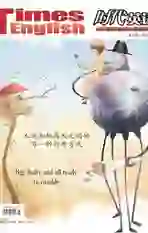跟踪导练(四)(4)
2015-04-29
阅读理解
We believe that there is more to education than preparation for a job. Children must be prepared for all aspects of their adult-life work, leisure, personal relationships, creative activities, dealing with money matters, independence, and parenthood.
However, it would be unrealistic to provide an education which gave no consideration to the needs of employers.
What type of training does the business world regard as important?
Many young people applying for jobs are, in the employers’ opinions, very weak in the basic skills of handwriting, grammar and spelling. Though further education at university level improves the students’ general ability, a report states, “In basic skills the standards remain stubbornly low.”
It is doubtful whether standards have lowered in recent years. What is certain is that employers do not believe the standard is now high enough. Do technological changes make greater demands upon the students’ abilities?
We should also remember that the job expectations of young people have increased. The girls who would have once become shop assistants or hairdressers now want to be secretaries. Boys who sought an apprenticeship(学徒身份)20 years ago now desire to have an engineering degree. But it is still the same girls and boys with the same degree of ability. No wonder there are problems in reaching the “necessary standards” of the business world.
Many employers believe that it is important for teachers to have experience outside the world of college and school. They should work for a while at some other kinds of jobs to see how the world of business and commerce is different from their own. The teaching profession and society in general need a greater under-standing of manpower needs and therefore of “the desired” direction of the education system.
1. In the writer’s opinion, education should ___ .
A. improve adults’ life
B. pay more attention to basic skills
C. centre on students’ working ability
D. take the needs of employers into consideration
2. In talking about basic skills, the employers mean the standards ___ .
A. have loweredB. are changing
C. can’t meet the needD. should be kept the same
3. The underlined part in Paragraph 6 refers to those who ___ .
A. are likely to be unemployed
B. have just left the middle school
C. are looking for jobs far beyond their abilities
D. might have become shop assistants, hairdressers and apprentices in the past
4. It’s suggested that teachers should ___ .
A. never change their jobs
B. improve their teaching methods
C. spend more time on their school work
D. get some working experience outside school
完形填空
There was a very rich village landowner in India who was very generous. Everybody 1 him. Once he decided that for three days he would 2 things, including money, only to the 3 . People were happy to receive rice, vegetables, money and other kinds of things.
One poor man got a very heavy sack(麻布袋)of rice. 4 he was such a poor man, he was very satisfied with it. But when he emptied the sack, to his great 5 , he found twenty gold coins inside the rice. His greedy(贪婪的)wife was 6 .
The husband said, “The landowner didn’t intend to give me these gold coins. This must be a 7 . I should return these coins.” The wife said 8 , “You are a fool! We are so poor. This is the time to take the gold to the market and exchange it 9 lots of money.” The husband 10 to do what his wife suggested. Then they 11 about the gold for hours. Of course, the husband 12
because it was he who had brought the rice home.
The following day, he went 13 to the rich man’s house and said, “You were so 14 to give all of us so many things. I have found these twenty gold coins put in the rice sack by mistake. Now I have come to 15 them to you. Though I am only a beggar, I can 16 accept this kind of gift if it was a mistake.” The rich man was so 17 by his sincerity and decided to give the poor man twice the amount. He said, “You brought me twenty gold coins and now you are getting forty. You are such an honest man. I am going to 18 an honest man as my housekeeper. Will you come and have a 19 ?”
As expected, the rich man finally found his 20 house-keeper—the poor but honest man.
1. A. pleasedB. admiredC. enviedD. appreciated
2. A. give awayB. get backC. throw awayD. set off
3. A. sickB. youngC. poorD. old
4. A. AlthoughB. ButC. WhileD. Since
5. A. excitementB. surpriseC. disappointmentD. joy
6. A. frightenedB. delightedC. crazyD. satisfied
7. A. testB. mistakeC. jokeD. trick
8. A. eagerlyB. patientlyC. foolishlyD. angrily
9. A. forB. toC. withD. by
10. A. managedB. triedC. refusedD. permitted
11. A. discussedB. thoughtC. arguedD. quarrelled
12. A. finishedB. wonC. changedD. defeated
13. A. backB. awayC. roundD. off
14. A. wealthyB. friendlyC. kindD. careless
15. A. returnB. sentC. giveD. recover
16. A. hardlyB. neverC. seldomD. nearly
17. A. happyB. shockedC. ashamedD. moved
18. A. regardB. trainC. employD. help
19. A. jobB. breakC. drinkD. try
20. A. kind-heartedB. wiseC. specialD. faithful
